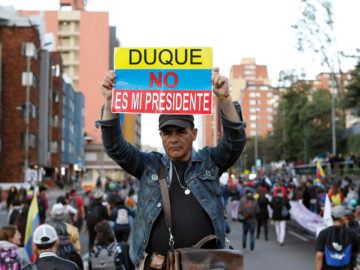Sergio Guzman in The Global Americans:
 The past week’s demonstrations in Colombia have shown that popular dissatisfaction is surging after a year of COVID-19 lockdowns. Although the government’s tax reform proposal may have been the immediate trigger for the unrest, pent-up anger has been building since 2019 over social inequality, unemployment, the murder of social leaders, and the conspicuous absence of the state in peripheral regions far from Bogotá. All of these problems have only been aggravated by the pandemic.
The past week’s demonstrations in Colombia have shown that popular dissatisfaction is surging after a year of COVID-19 lockdowns. Although the government’s tax reform proposal may have been the immediate trigger for the unrest, pent-up anger has been building since 2019 over social inequality, unemployment, the murder of social leaders, and the conspicuous absence of the state in peripheral regions far from Bogotá. All of these problems have only been aggravated by the pandemic.
If the proposed tax reform was the spark, police brutality was the flame that set fire to the protests. Videos shared widely on social media show security forces clubbing, tear gassing, and even killing demonstrators—over 19 people have been killed by police since April 28—in cities such as Bogotá, Cali, and Manizales. International human rights organizations, the United Nations, and foreign governments have all called on the Colombian government to de-escalate the situation, convene a dialogue, and investigate incidents of wrongdoing by police. Nevertheless, the government has refused to acknowledge the role that police brutality played in escalating the protests and continues to defend all police actions, no matter how egregious, as having been necessary to restore law and order.
More here.
